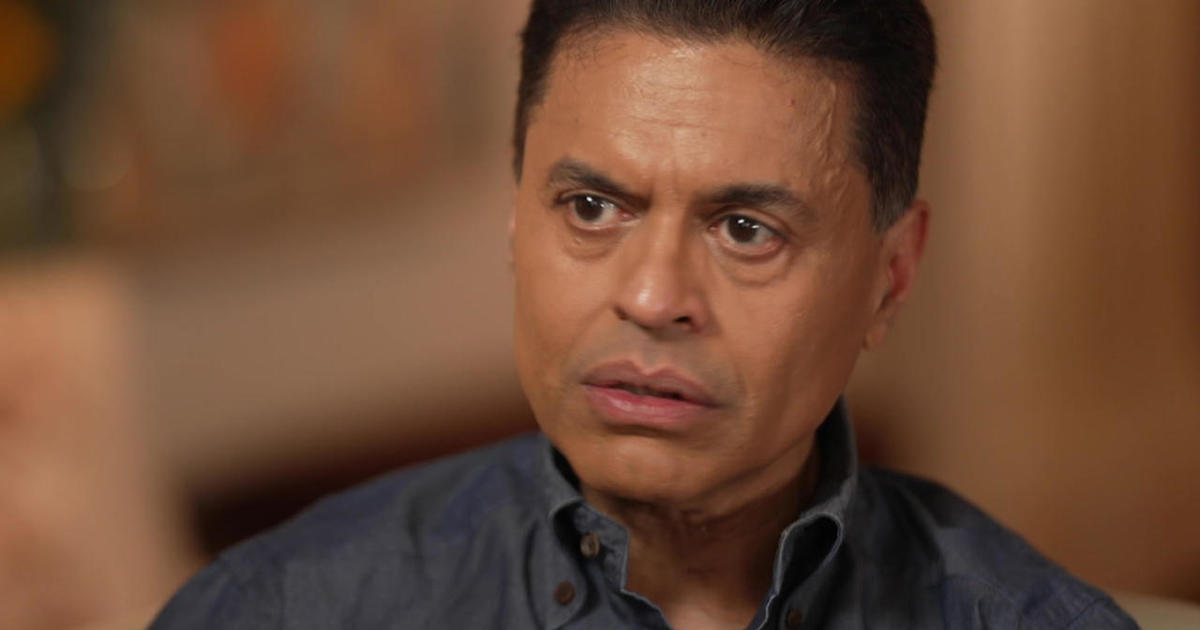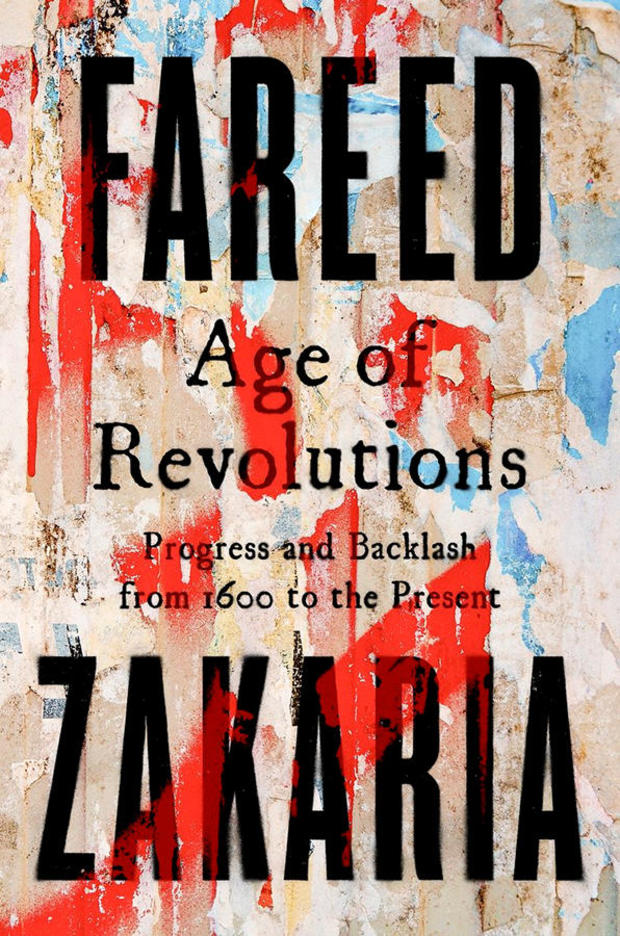CBS News
Fareed Zakaria decries the “anti-Americanism” in America’s politics today

As host of “GPS (Global Public Square)” on CNN, 60-year-old Fareed Zakaria says he’s teaching international relations to the masses. “I’ve always thought of journalism as sort of, at some level, public education,” he said.
In a digital studio with plasma screen walls, Zakaria dives into global issues with scholars, U.S. presidents, and even the occasional celebrity. No shouting allowed!
CBS News
Zakaria is an optimist, and he’d like to think of himself as non-partisan, at a time when it’s hard for a news anchor to go on TV and not make clear whether they support Donald Trump or not. He said, “The weirdness of the Trump presidency and candidacy and such – being such an assault on traditional American, I would argue, mores and norms – and the lies, the constant lying, so you feel as though you’re not actually taking a side when you say that, ‘This guy is lying.’ But it sounds like you’re taking a side, right? And then he attacks you. Now you’re in the ring, whether you want to be or not.”
Sanneh asked, “Is that uncomfortable for you? I get the sense that you did not get into this in order to become a partisan figure?”
“I don’t pretend that I don’t have views,” Zakaria said. “But it’s my analysis rooted in fact, rooted in history.”
In terms of his politics, Zakaria said, “I find that on most issues these days, I’m left-of-center. When I was in college, I was a Reaganite. I was more right-of-center.”
Born in Mumbai to Rafiq, a politician, and Fatma, a journalist and editor, Fareed came to America to go to college on a scholarship at Yale, which, he said, no one had heard of. “My dad, to his dying day, could never pronounce Yale. He would always call it Ale,” Zakaria said. “So he’d be like, ‘How are things at Ale?'”
His original plan was to get an education in the United States and then go back to India. “But very quickly, I have to confess, I kinda fell in love with America,” he said.
CBS News
He went on to Harvard, getting a Ph.D. in political science in 1993. On the side, he gained a culinary education. “I learned how to cook by watching Jacques Pépin on public television!” he said.
By 28, he was managing editor of Foreign Affairs magazine. In 2000, he joined Newsweek as a columnist.
He initially supported the Iraq War, which, he says, he later came to regret. “In this case, I think I lost my judgment, because, as somebody who grew up Muslim, I was worried that I was not gonna seem sufficiently, you know, tough on Muslim dysfunction,” he said. “So, there was a part of me that, I think, wanted to show my patriotic credentials.”
In 2015 he called the Iraq war “a failure and a terrible mistake.” “I think the U.S. lost enormous credibility,” said Zakaria. “It was, turned out to be, a massive waste of American resources, of American lives.”
During those years, Zakaria seemed to be everywhere—a widely-read print columnist, and also a TV host, first on PBS, and then, starting in 2008, on CNN. But in 2012, he was accused of plagiarism. He was briefly suspended by Time magazine (where he was a contributing editor-at-large) and by CNN.
“I’ve had these setbacks,” he said. “And initially, you know, you get defensive, and you say to yourself, Wait a minute… Then, you have to step back and say to yourself, Was this at the level of quality that I would be comfortable with? And the answer is, no. And so I just said to myself, Okay, I’m gonna be three times more careful.“
In his new book, “Age of Revolutions” (published March 26 by W.W. Norton), Zakaria writes about how societies embrace change, and resist it, too.
W.W. Norton
“You have the information revolution which connects everybody. And then, you have, at the same time over the last 30 or 40 years, this identity revolution where, all of a sudden, whether it’s your sexual orientation, whether it’s your national origin, whether it’s the color of your skin, you’re saying, you know, ‘I want to be able to be me.’ And, of course, what has happened is, it has left a lot of people deeply unmoored, anxious, feeling like their world is going away. And now we’re living through the backlash. How well you can navigate that backlash is really what determines whether you’ll succeed or fail in the end.”
He believes the speed of recent changes has unsettled the country. He said, “We have this group of people in America who feel that they are not benefiting from all the changes in society. And that worries me a lot. There is a kind of anti-Americanism at the heart of this. You can’t love your country and hate everything about it.”
Zakaria is not just an observer. He speaks with world leaders regularly both on-air and off-, including President Joe Biden. “He’s occasionally called me into the White House to talk about what I think is going on in the world,” he said.
Sanneh asked, “Are you reassured by what you hear from him in private, both his ideas, but also his fitness for the office?”
“Yeah. When I have talked to him, one-on-one, or in a small group, he’s alert, he’s sharp, he’s wise, I would say, most importantly,” Zakaria said. “I think he is performing his job as president extremely well. Now, can you have the energy to hustle on the campaign trail? That’s hard.”
Zakaria said he didn’t want Biden to run for re-election. Now that the campaign is underway, he thinks the choice is obvious.
But he said it’s not easy to be an optimist these days.
“I worry a lot about what is happening in America right now,” he said. “There was sort of guidance, there were gatekeepers, and part of this revolutionary age is that’s all gone away. And what you’re finding is that there’s no self-regulatory mechanism, that there’s no way that you can somehow say, ‘No, this is beyond the pale.’
“I will return to my optimism. We will find a way. But this is a very rocky period.”
READ AN EXCERPT: “Age of Revolutions” by Fareed Zakaria
For more info:
Story produced by Mary Raffalli. Editor: Robert Kaplan.
CBS News
Hurricane Oscar forms off the Bahamas

The National Hurricane Center in Miami says Hurricane Oscar has formed off the coast of the Bahamas.
Oscar, which the hurricane center characterized as “tiny,” formed Saturday. Oscar – the 15th named storm of the hurricane season – formed as a tropical storm just east of the Turks and Caicos islands, before quickly becoming a hurricane.
The government of the Bahamas has issued a hurricane warning for the Turks and Caicos Islands and the southeastern Bahamas. The government of Cuba has issued a hurricane watch for the provinces of Guantanamo, Holguin, and Las Tunas.
Turks and Caicos and southeastern Bahamas can expect heavy rainfall later tonight and tomorrow, the hurricane center said. Rains are expected to spread to eastern Cuba on Sunday.
National Hurricane Center
The storm’s maximum sustained winds were clocked at 80 mph with higher gusts. Its center was located about 165 miles east-southeast of the southeastern Bahamas and about 470 miles east of Camaguey, Cuba.
Tropical Storm Nadine formed hours earlier in the western Caribbean and is moving westward toward Mexico’s Yucatan Peninsula. It made landfall near Belize City in Belize around 12 p.m. Eastern.
Heavy rain and tropical storm conditions were occurring over parts of Belize and the Yucatan peninsula.
A tropical storm warning is in effect for Belize City and from Belize to Cancun, Mexico, including Cozumel.
The Atlantic hurricane season officially began on June 1 and finishes Nov. 30, with most activity occurring between mid-August and mid-October. Hurricane activity tends to peak in mid-September, according to the National Oceanic and Atmospheric Administration.
In Florida, Gulf Coast communities are struggling in the wake of back-to-back hurricanes, as Hurricane Helene rammed into the region less than two weeks before Hurricane Milton arrived.
CBS News
10/19: Saturday Morning – CBS News

Watch CBS News
Be the first to know
Get browser notifications for breaking news, live events, and exclusive reporting.
CBS News
Cuba electricity returns for some after major power outage left millions in the dark

Cuba’s government on Saturday said that some electricity was restored on the island after one of the country’s major power plants failed and left millions without electricity in an outage that started two days earlier.
Energy minister Vicente de la O Levy said the country had 500 megawatts of energy in its electrical grid early Saturday. He posted on X that “several substations in the west now have electricity.”
O Levy also said two thermoelectric power plants are back and two more will resume their operations “in the next few hours.”
In addition to the Antonio Guiteras plant, whose failure on Friday affected the entire national system, Cuba has several others and it wasn’t immediately clear whether or not they remained functional.
There is no official estimate for when the blackout will be ended. Even in a country that is used to outages amid a deepening economic crisis, Friday’s supply collapse was unprecedented in modern times, aside from incidents involving intense hurricanes, like one in 2022.
The Cuban government has announced emergency measures to slash electricity demand, including suspending classes, shutting down some state-owned workplaces and canceling nonessential services. Officials said that 1.64 gigawatts went offline during peak hours, about half the total demand at the time.
Local authorities said the outage, which started in a smaller scale on Thursday, stemmed from increased demand from small and medium-sized companies and residences’ air conditioners. Later, the blackout got worse due to breakdowns in old thermoelectric plants that haven’t been properly maintained and the lack of fuel to operate some facilities.
Changes to electricity rates for small- and medium-sized companies, which have proliferated since they were first authorized by the communist government in 2021, are also being considered.






